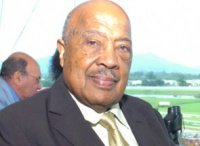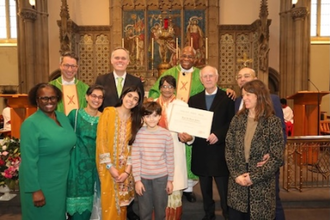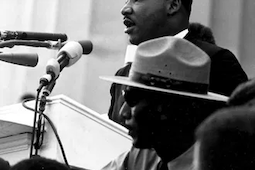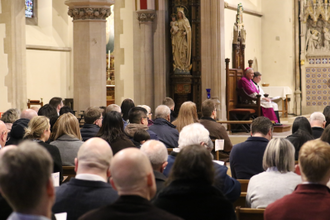Obituary: Sir Ellis Clarke

Sir Ellis Clarke
Sir Ellis Clarke, the man who took Trinidad and Tobago to independence and became its first president, has died at the age of 93.
The father of Catholic Association for Racial Justice chair Margaret Ann Fisken, Sir Ellis will be best remembered for his legal brain and political know how that helped Trinidad and Tobago move peacefully from British colonial rule to independent republic during the 1960s and 70s. He helped draft the constitution, then as the first President he provided stability over his 11 year period in office. One major challenge arose when incumbent Prime Minister and founder of the Peoples National Movement (PNM) Eric Williams died in office in 1981. It then fell to the President to use his powers to appoint successor George Chambers. The change passed off peacefully.
Sir Ellis was always more at home with the Afro-Trinidadian based PNM party in power, so when the Indo-Trinidadian based opposition National Alliance for Reconstruction took over in 1986 immediate problems ensued. This saw disagreement between the President and Prime Minister Arthur Napoleon Raymond Robinson, over the powers of appointment. The reappointment of James Alva Bain to the Public and Police Service Committee in 1986 ended up in court, with the President triumphing. It became clear though to Sir Ellis that the relationship with the Prime Minister and ruling party had become untenable, so he decided not to seek re-election as President for a third term.
Sir Ellis's period as president though coincided with relative economic prosperity on the islands with the oil based economy benefiting from the booming international prices between 1972 and 1983. Though by 1986, the International Monetary Fund had been called in to provide funding in return for an austerity programme that resulted in 10 per cent unemployment.
One highlight of Sir Ellis's time as president was the first ever papal visit to Trinidad in 1985. The visit only lasted a day but the arrival of Pope John Paul II on an island where Catholicism remains the dominant religion is still remembered.
After stepping down from the Presidency, Sir Ellis remained involved in national life, advising on political and legal matters, latterly regarding more constitutional reform. He also served on a policing commission. Internationally he remained active, advising Australia's Republican Advisory Committee in 1993 as to the practicalities of becoming a republic.
Born on 28 December 1917 to a middle class family in Belmont, Sir Ellis went to St Mary's College, where he won an island scholarship in mathematics. He then went onto study law at London University, being called to the Bar at Gray's Inn, in 1941.
Sir Ellis then served in private practice in Trinidad and Tobago until 1954 when he undertook a number of roles in the colonial government. These included those of Solicitor General, Deputy Colonial Secretary, Attorney General and Constitutional Advisor to the Cabinet.
After independence in 1962, Sir Ellis became a foreign diplomat, holding numerous posts,sometimes simultaneously, including permanent representative to the United Nations and ambassador to the United States and Mexico. He notably recalled presenting his credentials to US President John F Kennedy at the height of the Cuban missile crisis of October 1962. Sir Ellis met the President with the fate of the world hanging in the balance. The two men were the same age with young children. He then caught a flight and by the time he reached his destination the crisis had been averted.
The link with the Kennedy family developed further over the Washington years with Sir Ellis's children Margaret Ann and Peter playing together with Robert Kennedy's children at the family compound.
Sir Ellis was bestowed the Companion of St. Michael and St. George (C.M.G.)in 1960, and made a Knight Bachelor (Kt. Bachelor) in 1963.
He was appointed governor general of Trinidad and Tobago by the Queen in 1972, until the country became a republic in 1976, when he became president.
Sir Ellis married Grenadian Ermyntrude Hagley, an anglican, in 1952, enjoying nearly 50 years of life together until her death at the age of 81 in 2002. The couple had two children Margaret Ann, who is the chair of Catholic Association for Racial Justice in London, and Peter, who lives in Trinidad.
A dedicated father and grandfather he would spend several months each year in London with his daughter Margaret Ann's family and seeing old friends. During that time he was a daily communicant at the Brompton Oratory in west London.
It was on 24 November that Sir Ellis was struck down by a stroke from which he never recovered. He died on 30 December, just two days after turning 93. Sir Ellis is survived by his daughter Margaret Ann and son Peter. He has four grand children: Katrina, Alexander, Michael, John Peter and David.


















